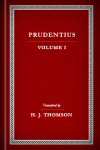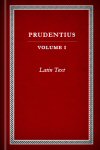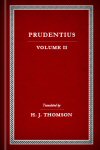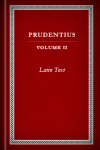Works of Prudentius (4 vols.)
Digital Logos Edition
Overview
The Works of Prudentius is a collection of momentous poems by the fourth-century Roman hymn writer and poet Prudentius. Born into a Christian home, he studied religion, literature, and rhetoric. His poetry was strongly influenced by the Bible, the martyrs, and the works of Tertullian and Saint Ambrose.
His lyrical works have endured—hymns such as “Corde Natus Ex Parentis” (“Of the Father’s Love Begotten”) and “O Sola Magnarum Urbium” (“Earth Has Many a Noble City”) from Liber Cathemerinon remain in use today. Prudentius’ most significant literary contribution, however, is Psychomachia, which is considered the first major work of pure Christian allegory. The tale of virtue versus vice paved the way for works of medieval allegorical literature like The Divine Comedy, Piers Plowman, Everyman, and even Pilgrim’s Progress.
The first volume also includes Prudentius’ didactic works Apotheosis, in which he defends the divinity of Christ, and Hamartigenia, in which he refutes the gnostic dualism of Marcion. The second volume features Peristephanon Liber, 14 hymns describing the acts of mostly Spanish martyrs, as well as Tituli Historiarum, 49 four-line stanzas chronicling iconic Bible scenes.
Volumes 1 & 2 of the works of Prudentius will be downloaded as a single resource.
Volumes 1 & 2 of the works of Prudentius in Latin will be downloaded as a single resource.

- Full text of the first major work of Christian allegory, Psychomachia
- Two volumes of the lyrical, didactic, and polemical works of Prudentius
- Loeb Classical Library editions
Latinists will welcome the appearance of the Loeb Prudentius not only on account of an excellent translation by Professor Thomson, but because the poet himself is now available in a more easily accessible form . . . The Loeb Library thus completes the number of the Poetae Latini Maiores, a title which Prudentius may claim with regard to both Classical and Christian poets, for he has much of the quality of the Silver Age writers and in some respects surpasses them.
—The Classical Review
- Title: Works of Prudentius
- Author: Prudentius
- Translator: H. J. Thomson
- Series: Loeb Classical Library
- Publisher: Harvard University Press
- Volumes: 4
- Pages: 856
This title is included in the following collections
You can save when you purchase this product as part of a collection.
Loeb Patristic Library Builder...
$199.99$199.99Loeb Classical Library Builder...
$1,269.18$508.99Classic Catholic Scholarship C...
$3,413.99$3,413.99Classic Scholarship Collection...
$12,102.39$7,299.99

Prudentius, vol. 1
- Author: Prudentius
- Translator: H. J. Thomson
- Series: Loeb Classical Library
- Publisher: Harvard University Press
- Publication Date: 1949
- Pages: 222
This volume contains H. J. Thomson’s translations of Praefation, Liber Cathemerinon, Apotheosis, Hamartigenia, Psychomachia, and Contra Orationem Symmachi, Liber I.

Prudentius, vol. 1: Latin Text
- Author: Prudentius
- Series: Loeb Classical Library
- Publisher: Harvard University Press
- Publication Date: 1949
- Pages: 222
This volume contains the Latin texts of Praefation, Liber Cathemerinon, Apotheosis, Hamartigenia, Psychomachia, and Contra Orationem Symmachi, Liber I.

Prudentius, vol. 2
- Author: Prudentius
- Translator: H. J. Thomson
- Series: Loeb Classical Library
- Publisher: Harvard University Press
- Publication Date: 1953
- Pages: 206
This volume contains H. J. Thomson’s translations of Contra Orationem Symmachi, Liber II, Peristephanon Liber, Tituli Historiarum, and Epilogus.

Prudentius, vol. 2: Latin Text
- Author: Prudentius
- Series: Loeb Classical Library
- Publisher: Harvard University Press
- Publication Date: 1953
- Pages: 206
This volume contains the Latin texts of Contra Orationem Symmachi, Liber II, Peristephanon Liber, Tituli Historiarum, and Epilogus.
Aurelius Prudentius Clemens was born in 348 in the Roman province of Tarraconensis. He lived mostly in northeastern Spain, but visited Rome between 400 and 405. He became a barrister and later an administrator. Prudentius was a strong Christian who admired the old pagan literature and art, especially the great Latin poets whose forms he used. He viewed Roman achievements in history as preparation for the coming of Christ and the triumph of a spiritual empire.
Reviews
2 ratings
Phil Niebergall
1/10/2020

Allen Bingham
6/6/2015